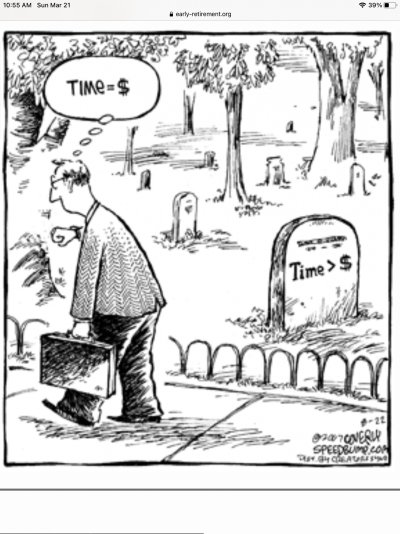Having said that, many on this forum, especially the ones' that have a hard time spending money, could probably benefit from reading it.
I wish my parents and I would have had this book ages ago. Nothing in it is "OMG, revolutionary!" but it puts stuff together that I need to read (and keep reading). I'm definitely one that has a hard time spending $$$ and needed this book.
I finished this book recently and can't stop thinking about it....
I would be interested in folk's opinions on time vs money in general and what your reactions are to the book if you read it. This is of course a complex topic when considering LTC and other considerations.
Same! I've been a huge fan of the book for a while!
I recently had lunch with a friend that is 55 years old and has had a really good successful life. He makes hundreds about $400k a year in mostly passive income, and lives extremely frugally. During lunch he mentioned his goal is to hit 10 million dollars in assets by the time he is 60.
Based on just simple back of the envelope math, he is definitely not going to die with zero!
He doesn't have a spouse, he doesn't have any children or other dependents, and lives incredibly frugally.
I gently brought up the idea of dying with zero, and clearly didn't resonate with him. Even if he quadrupled his expenses and his income trout to zero, I'm still thinking he's going to die with a ton of money.
Unfortunately, I've seen many examples in his life where is frugality applications with relationships (both friends and romantic)... And it doesn't seem like that's going to change anytime soon.

Hopefully a combination of reading this book multiple times, reading threads like this, and continual experiences with other people like my friend above, will help me get past some of my own issues with being overly frugal.

